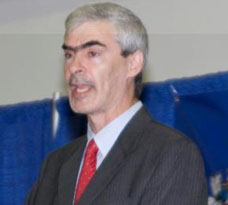(Barbados Nation) The West Indian Rebel Tours of South Africa in 1983 and 1984 made little to no impact towards the development of black cricket in South Africa.
That is the conclusion drawn by Professor Alan Cobley, pro vice-chancellor for undergraduate studies of the University of the West Indies, as he delivered the seventh of the lecture series, Fire In Babylon: Cricket as Popular Culture in Barbados.
Professor Cobley who spoke extensively on the history of cricket among blacks in South Africa and the relationships between West Indians and the white cricket establishment during the era of apartheid, addressed an audience of modest size on Tuesday evening at the Queen’s Park Steel Shed in a lecture entitled Cricket and the Apartheid Era. In answer to his own question – What, if anything, did the rebel tours achieve? – Cobley, a graduate of the University of Manchester, the University of York, and the School for Oriental and African Studies, London, was of the opinion that “the most damning thing I could say about the rebel tours was that they were irrelevant in the history of the development of black cricket in South Africa”.
Cobley, who joined the UWI, Cave Hill Campus in 1986, said those who made those controversial tours to then racially divided South Africa, made little of a difference. “I have listened to, read of the various encounters, and listened to the stories of some of the rebels concerning their positive experiences while in South Africa. I have no doubt that those who have spoken about this believe they made a positive difference.
“Who would not want to believe that they had made a positive difference after all that they had been through? But my frank assessment is that they did not make a positive difference.”
He recounted having visited South Africa around the time of the 1983 tour. “As a young graduate student, I happened to be in South Africa a few months after the first tour. The young black students and activists I met who were fighting the system of apartheid had nothing but contempt for the rebel tours. They were viewed as a PR stunt; a fig leaf to disguise the continuing deep-seated racism inherent in the South African cricket establishment. An excuse not to promote genuine non-racial cricket,” he said.
To him, white South Africans were similarly unimpressed by the tours. “As for the white community so far as I could tell, the West Indian tour was viewed as little more than an entertaining interlude which was quickly forgotten”. The series continues on Tuesday when historian Morris Greenidge will lecture on the evaluation and impact of the Sir Garfield Sobers Cricket Tournament. The lecture series is hosted by the Barbados Museum & Historical Society, The University of the West Indies’ Department of History & Philosophy and the National Cultural Foundation.





